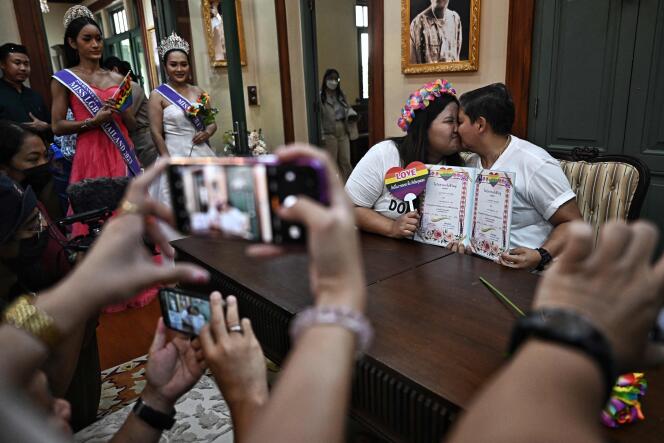Thailand’s legislative body achieved a historic milestone as lawmakers approved a ground breaking legislation recognizing same-sex marriage, positioning the nation as a trailblazer for LGBTQ+ rights in Southeast Asia.
In a momentous decision, the 500-member House of Representatives endorsed the “marriage equality” bill, an amendment to the Civil and Commercial Code, in its final reading on Wednesday. The bill garnered overwhelming support from 400 lawmakers, with 10 opposing it and five abstaining, following an extensive four-hour debate.
Read More: Tragedy Strikes Gaza as 12 Drown Attempting to Retrieve Airdropped Aid
While the legislation awaits approval from the Senate and royal endorsement to become law, observers anticipate its formal enactment by the end of 2024, solidifying Thailand’s status as the sole Southeast Asian country to embrace same-sex unions.
Danuphorn Punnakanta, an MP and chairperson of the lower house’s committee on marriage equality, hailed the bill as a crucial step toward achieving equality, emphasizing its aim to restore rights rather than merely bestow them.
The newly passed law redefines marriage as a partnership between two individuals, extending equal rights to LGBTQ+ couples in areas such as marital tax benefits, inheritance, and medical treatment consent for incapacitated partners. Notably, the legislation permits married same-sex couples to adopt children, although it retains the terms “fathers and mothers” instead of adopting the committee’s suggestion to use the gender-neutral term “parents.”
Thailand’s commitment to LGBTQ+ rights is further underscored by existing laws prohibiting discrimination based on gender identity and sexual orientation, positioning the country as a beacon of inclusivity in Asia.
Despite past challenges, including failed attempts to legalize same-sex marriage, widespread public support has propelled Thailand toward this landmark achievement. A recent government survey revealed overwhelming backing for the bill, with 96.6% of respondents in favor.
The significance of the legislation extends beyond legal recognition, resonating deeply with members of the LGBTQ+ community. Phisit Sirihirunchai, a gay police officer, expressed jubilation at the prospect of marrying his partner of five years, reflecting the personal significance of this milestone.
Politicians across the spectrum have pledged support for same-sex unions, with Prime Minister Sretta Thavisin championing the cause since assuming office. The collaborative effort of multiple political parties culminated in the passage of the unified bill, symbolizing bipartisan commitment to equality.
While Thailand’s progress sets a precedent in Southeast Asia, challenges persist in neighboring countries, where same-sex intimacy remains criminalized. However, Thailand’s legislative achievement marks a significant step forward for LGBTQ+ rights in the region, embodying a commitment to equality and inclusivity.



